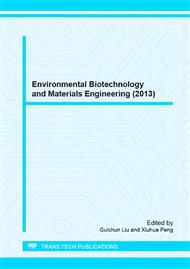p.380
p.386
p.390
p.397
p.401
p.407
p.412
p.416
p.420
Water Quality Reliability Analysis of Water Distribution Systems Based on Monte-Carlo Simulation
Abstract:
Water distribution systems (WDS) are important urban infrastructures which are designed for safely conveying potable water from treatment plant to users tap with adequate quantity and desired quality. The water quality reliability evaluation of WDS has positive and critical meanings for ensuring water supply security, reliability and maintaining a high level of service. In this paper, firstly the evaluation index of water quality reliability of municipal water distribution systems has been set up which is characterized by the residual chlorine availability. Then, taking into account the random nature of component failures, the variation of water demand through the 24 hours of a day and the chlorine variation of the treated water in water plant through the 24 hours of a day, the Monte Carlo-based reliability model are established based on the dynamic link library toolkit provided by EPANET 2.0 for the hydraulic and water quality calculation engine. Finally, the water quality reliability of each node and system is evaluated taking water network of some region in Tianjin Binhai High-tech Area (BHA) as example. The research results can be applied to the whole process from planning and design to operation of WDS, and the theoretical basis and decision support for optimal design and operation of WDS are provided for designers and decision-makers.
Info:
Periodical:
Pages:
401-406
DOI:
Citation:
Online since:
September 2013
Authors:
Price:
Сopyright:
© 2013 Trans Tech Publications Ltd. All Rights Reserved
Share:
Citation:


